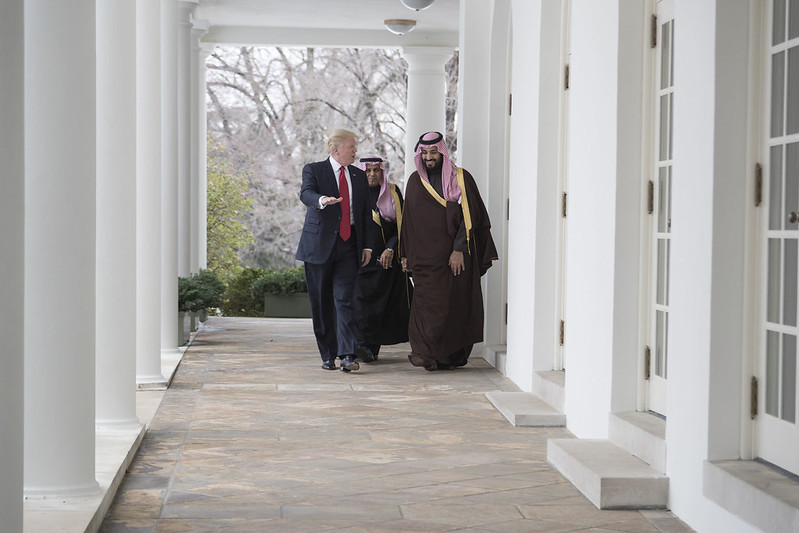
President Donald Trump walks with the Saudi Arabias Deputy Crown Prince Mohammed bin Salman, Tuesday, March 14, 2017, along the Colonnade outside the Oval Office of the White House in Washington, D.C. (Official White House Photo by Shealah Craighead)rrr
In Foreign Policy, Talal Mohammad suggests that the Arab states of the Persian Gulf are hoping Donald Trump will win the coming presidential election. During Trump’s first term, he aligned U.S. interests with Saudi and Emirati interests in the area when it came to Iran and Yemen, while Harris has suggested she will follow an approach similar to that of Barack Obama on Iran. Mohammad explains:
Under Trump, Saudi Crown Prince Mohammed bin Salman began negotiating a megadeal with the United States. It would establish a security pact, civilian nuclear cooperation, and defense cooperation—including arms sales—between the two countries.
There was a catch, however: Saudi Arabia would have to normalize ties with Israel, contingent on significant progress toward Palestinian statehood. Those talks have been hampered by the ongoing war in Gaza.
While it has been referred to by commentators as a NATO-style agreement, the proposed pact is more similar to the defense treaty that the United States has with Japan. Unlike NATO’s Article 5, this deal stops short of guaranteeing an automatic U.S. military action in the event of an attack, allowing Washington some discretion in how much support it gives Saudi Arabia.
By all accounts, Harris is more likely to limit the scope of U.S. security commitments to Riyadh—and adhere to established regulations—than Trump. In 2019, during Trump’s administration, Saudi Arabia suffered an attack on two Aramco oil installations. In response, the United States deployed additional troops, missile defense systems, and radar equipment to Saudi Arabia. Mohammed bin Salman is convinced that Trump’s willingness to provide unconditional support for Saudi security interests makes a formalized deal with the United States more feasible, even if the two-state solution remains a sticking point.
The Saudi crown prince seeks a military edge over his regional neighbors. The defense component of the agreement aims to bolster U.S.-Saudi military ties through joint training, advisory programs, and increased arms sales. Riyadh is keen to secure advanced air defense systems to counter drone and missile threats from regional adversaries, particularly Iran and its so-called axis of resistance.
Trump has a track record of delivering: In 2017, his administration facilitated a major arms deal with Riyadh, potentially worth $110 billion. This move may have significantly bolstered Saudi military capabilities and regional dominance. (Some analysts have argued that this figure was exaggerated, noting that much of the package consisted of informal letters of intent or interest rather than contracts.)
Read more here.
If you’re willing to fight for Main Street America, click here to sign up for the Richardcyoung.com free weekly email.




